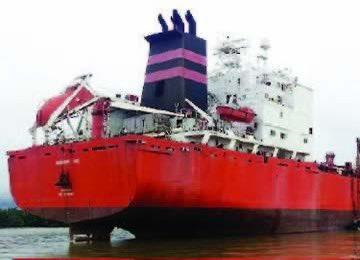Petrol marketers have imported 123 million liters and are in ongoing discussions with Dangote.
A minimum of four ships transporting imported petrol, docked at seaports located along the nation's borders from Friday, October 18, to Sunday, October 20, as per the Punch.
The dealers have mentioned that the output from the Dangote is currently inadequate to satisfy local demand.
They alleged that the facility was generating approximately 10 million liters of petrol each day, which falls short of the initial commitment to produce 25 million liters daily.
The initial delivery of 35,000 metric tonnes of PMS designated for West African Port Services arrived at the ASPM jetty on Friday, October 18, at 10:13 AM.
Subsequently, at 3:37 PM, 37,000 metric tonnes of fuel were designated for Intership. It also docked at the ASPM terminal jetty.
At 3:59 PM on the same day, another ship, transporting 10,000 metric tonnes of fuel, arrived at the dock. Peak Shipping has been appointed as its agent for this operation.
On Sunday at 8:02 am, a ship docked at the Eco Marine Terminal in Calabar, bringing with it a cargo of 10,000 metric tonnes of fuel.
George Ene-Ita, the spokesperson for the Nigerian Midstream and Downstream Petroleum Regulatory Authority, stated that marketers who possess valid import licenses are permitted to import PMS.
He emphasized, however, that the agency must conduct three essential tests on the products.
He said, “The products must be subjected to our testing protocols at the ports. The products must conform to stipulated standards before we authorise them to offload to their terminals.
“Also, before the smaller vessels bring it further inland to Nigeria, our people will fly to the place to see the product and carry out some tests to ensure the right specification is upheld.
“Tests are also done at the products’ origins. And when the products come in before they are released to the market, further tests would be conducted to ensure that they meet the specifications.”
Petrol marketers have imported 123 million liters and are in ongoing discussions with Dangote.
A minimum of four ships transporting imported petrol, docked at seaports located along the nation's borders from Friday, October 18, to Sunday, October 20, as per the Punch.
The dealers have mentioned that the output from the Dangote is currently inadequate to satisfy local demand.
They alleged that the facility was generating approximately 10 million liters of petrol each day, which falls short of the initial commitment to produce 25 million liters daily.
The initial delivery of 35,000 metric tonnes of PMS designated for West African Port Services arrived at the ASPM jetty on Friday, October 18, at 10:13 AM.
Subsequently, at 3:37 PM, 37,000 metric tonnes of fuel were designated for Intership. It also docked at the ASPM terminal jetty.
At 3:59 PM on the same day, another ship, transporting 10,000 metric tonnes of fuel, arrived at the dock. Peak Shipping has been appointed as its agent for this operation.
On Sunday at 8:02 am, a ship docked at the Eco Marine Terminal in Calabar, bringing with it a cargo of 10,000 metric tonnes of fuel.
George Ene-Ita, the spokesperson for the Nigerian Midstream and Downstream Petroleum Regulatory Authority, stated that marketers who possess valid import licenses are permitted to import PMS.
He emphasized, however, that the agency must conduct three essential tests on the products.
He said, “The products must be subjected to our testing protocols at the ports. The products must conform to stipulated standards before we authorise them to offload to their terminals.
“Also, before the smaller vessels bring it further inland to Nigeria, our people will fly to the place to see the product and carry out some tests to ensure the right specification is upheld.
“Tests are also done at the products’ origins. And when the products come in before they are released to the market, further tests would be conducted to ensure that they meet the specifications.”





